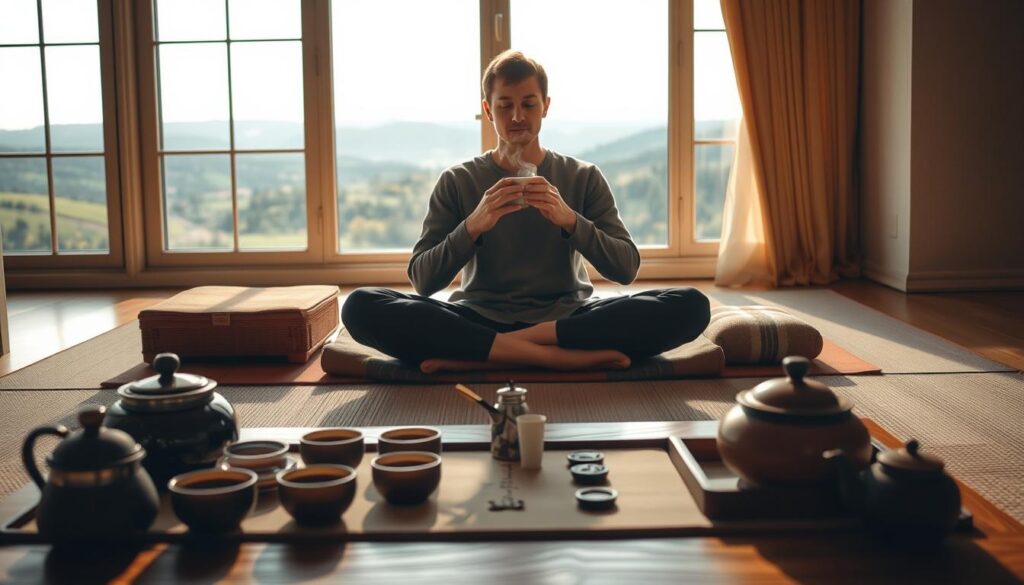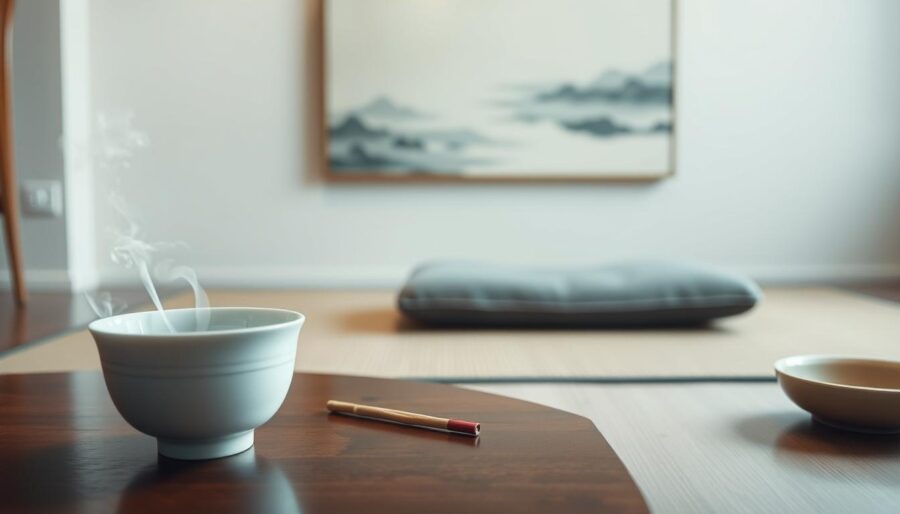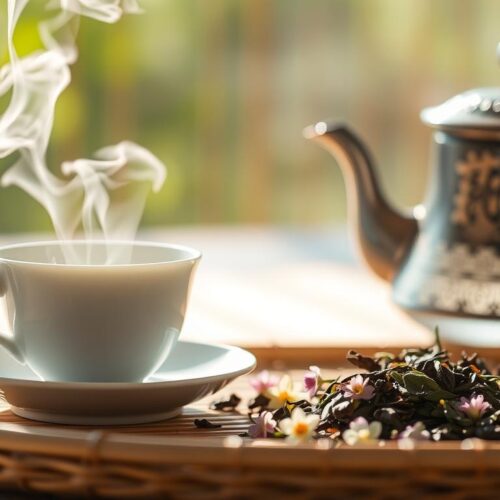Tea and meditation have been linked for centuries in Eastern spiritual traditions, especially Zen. These practices use tea to help focus and encourage mindfulness during meditation. This blog explores how tea helps in meditation, showing how it can improve your mindfulness journey.
The Origins of Tea and Its Cultural Significance
Tea has a deep and interesting history, starting in China around 2737 BCE. Ancient writings show that tea began as an herbal drink. It quickly became a key part of culture. As tea spread to different Asian countries, it became more than a drink. It turned into a spiritual experience.
The importance of tea in Eastern cultures is big. It’s not just a beverage, but a ritual that unites people. In places from Japan to India, tea is key in ceremonies. It helps people find peace and learn about themselves. This tradition creates a calm space for meditation and deep thoughts.
Learning about tea’s beginnings shows us its spiritual side. Enjoying tea helps people find quietness and peace. So, this old drink is loved all over the world. People don’t just enjoy its taste. They also value how it helps their spiritual growth.
The Concept of Meditation
Meditation involves different methods that aim for inner peace and knowing oneself better. People use these methods to improve their attention, reduce stress, and achieve emotional stability. Zen Buddhism and mindfulness are especially popular ways to find mental peace and clarity.
Zen Buddhism focuses on simplicity and experiencing things directly. Its followers practice seated meditation, or zazen, letting thoughts flow freely. This helps develop deep self-awareness and living in the moment. Mindfulness, on the other hand, includes activities that keep people fully present in their everyday tasks. It helps them notice their thoughts and feelings.
Both Zen Buddhism and mindfulness encourage being mindful and more self-aware. Adding these meditation techniques to your life can help you handle life’s ups and downs more smoothly and insightfully.
How Tea Enhances Meditation Practices
Adding tea to your meditation can make the experience better. Drinking tea before or during meditation helps your body and mind get ready. It helps you think deeper and clearer. The act of making and enjoying tea helps keep you focused. You pay attention to the smell of the leaves and how warm the cup is. These little things make you more mindful.
Many teas help you relax. For example, green tea has L-theanine. This amino acid lowers stress and helps you focus. Teas like chamomile or lavender are known to calm you. They help relax your body and mind, making it easier to meditate. As you drink your tea, notice its calming effect on your mind.

Using tea in your meditation makes the practice more meaningful. It helps you enjoy tea and meditation more. By exploring different teas, you make your practice special. Each sip brings moments of calm.
Notable Tea Traditions Worldwide
Tea traditions around the world showcase rich cultural rituals. The Japanese tea ceremony, known as Chanoyu, stands out. It is rooted in Zen Buddhism and values simplicity. Every movement is made carefully. This creates a calm space, encouraging all to stay in the moment.
The Chinese tea culture, on the other hand, focuses on nature. It aims to bring peace and balance. Its ceremonies involve detailed rituals that admire tea’s beauty and its natural essence. They help people start their journey toward being mindful, allowing them to find a deeper connection with nature and themselves.
Both Japanese and Chinese tea traditions share a deep link with mindfulness. They teach us to slow down and cherish each moment. Through reflecting on these practices, we see the global appreciation for tea and its cultural significance.
Popular Types of Tea for Meditation
Some teas are known for making meditation better. Herbal teas, like chamomile and lavender, help create a calm space. They make it easier for you to focus when you meditate.
Green tea is also a great choice. It has L-theanine, which helps you relax without feeling sleepy. This lets you stay alert yet peaceful, ideal for meditating. Picking the right tea can make a big difference in your meditation.
- Chamomile: Known for its soothing properties, perfect for winding down.
- Lavender: Offers a floral aroma that calms the senses, aiding concentration.
- Green Tea: Balances relaxation and alertness, enhancing mindfulness clarity.
- Peppermint: Refreshes the mind and enhances focus during meditation.
- Rooibos: Naturally caffeine-free and rich in antioxidants, supporting a peaceful mindset.
Using these teas can make your meditation sessions more powerful and enjoyable.
Making Tea Part of Your Meditation Routine
Making tea a part of your meditation can deepen your mindfulness. Start by making a peaceful space for both tea-making and meditation. This spot should help you feel calm, helping you relax and feel the moment.
Build a daily ritual around the gentle craft of brewing tea. Choosing your tea is a thoughtful process, thinking about tastes and smells. Boiling water and getting your cup ready should be done slowly. Every step helps you focus more, getting your mind ready for meditation.
Getting used to this daily ritual makes the connection between tea and mindfulness stronger. Try keeping a journal of your tea meditation times. Note how each one feels with different teas. This will make your tea meditation richer and help your mindfulness grow.
| Step | Description |
|---|---|
| 1. Create Your Space | Designate a peaceful area for tea-making and meditation. |
| 2. Select Your Tea | Choose a tea that resonates with you, considering its flavor and benefits. |
| 3. Boil Water | Mindfully heat the water, focusing on the sound and the process. |
| 4. Prepare the Cup | Pour the water over the tea and watch it steep, engaging your senses. |
| 5. Transition to Meditation | Once your tea is ready, move into meditation with a focused mindset. |
The Ritual of Brewing Tea
The act of brewing tea can become a deep ritual, offering peace in a busy day. Each step encourages you to be mindful in preparing your tea. Start by choosing your tea leaves, enjoying their unique smells and textures. This choice makes the experience personal and immersive.
When heating the water, think about the temperature your tea needs. Notice the colors and movements as the leaves open in hot water. The aroma fills the room, pulling you into a deeper connection with the moment.
As you pour the water, focus on the moment. Watch it flow over the leaves, releasing their flavors. This careful attention makes the ritual more meaningful. After brewing, savor the first sip. Let the warmth bring you into the present.
Doing this tea ritual with care creates a space for mindfulness. It makes you appreciate tea more and gets you ready for meditation. Let this ritual be a treasured part of your day, boosting both your mindfulness and enjoyment of tea.
Pairing Tea with Meditation Techniques
Adding tea to your meditation can take it to a new level. While you sip on your warm tea, pay attention to your breathing. This turns drinking tea into a calming ritual that helps you relax. Feel the warmth of the tea and let it bring you into the present.
Let the smell and taste of the tea keep you in the now. These experiences help you stay focused during meditation. It makes every moment special. You might try visualizing or keeping an eye on your thoughts as you stay focused on your breath.
Drinking tea mindfully is a chance to pay attention. Notice how your body feels and let your breathing match the rhythm of your sips. This practice deepens your mindfulness, making a simple drink a peaceful experience.
Personal Experiences with Tea and Meditation
Many people have shared how tea experiences deeply connect with their meditation. They talk about how making and enjoying tea increases mindfulness and calm. One person said drinking a certain green tea at night made their meditation better, helping them find peace quicker.
These stories suggest that tea and meditation together can lead to inner peace. Another person uses their favorite herbal tea to help focus during meditation. They said chamomile tea not only calms them but also makes the practice special.
These stories inspire others to explore tea with meditation. Engaging with tea enhances meditation and encourages personal growth. It creates a moment for reflection through shared tea experiences.

Resources for Further Exploration
If you’re keen to learn more about how tea ties into meditation, there’s a lot available for you. You’ll find books on tea meditations that cover its history and how it’s practiced today. For example, “The Book of Tea” by Okakura Kakuzo dives deep into Japanese tea culture. Another good read is “Tea and the Art of Mindfulness,” which links making tea with spiritual exercises.
Additionally, the internet is packed with courses on tea and mindfulness. There are guided meditations focused on tea that can help improve your spiritual journey. You can find video lessons, audio instructions, and articles explaining how tea aids meditation. Diving into these materials will grow your knowledge and enhance your meditation practice.
Conclusion: The Harmony of Tea and Meditation
Tea and meditation together offer a calm blend that makes you want to slow down and enjoy now. As you dive into these practices, you start a journey of mindfulness. This journey leads to better self-understanding and peace. The benefits of tea and meditation go past just feeling relaxed. They bring a needed balance to your daily life, making your mind and body better.
Looking into how tea and meditation connect shows how these rituals can ease modern life’s stress. Adding tea to your meditation makes a special place for calm and thought. This habit can bring you closer to insightful truths and a calmer life over time.
No matter if you’re new to tea or have meditated for years, this soothing drink can make your practice better. Inviting tea into your routine is a step towards balance. It brings calm to every part of your mindfulness journey.




